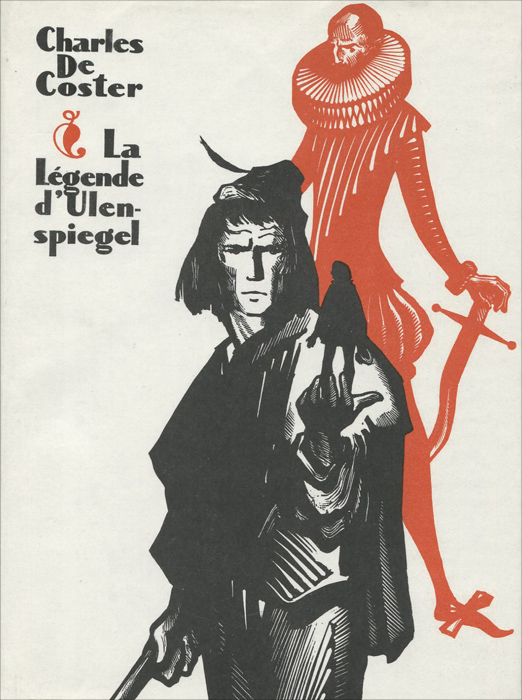Книга: Charles de Coster «La legende d'ulenspeiegel»

|
Воссоздав обстановку нидерландской буржуазной революции XVI века и борьбы против испанских поработителей и католической церкви, нарисовав широкую панораму национальной жизни, Ш. Де Костер сделал народ своим подлинным героем. Воплощением неумирающего, вечно юного "духа Фландрии" предстает в книге живой, глубоко человечный образ Тиля, борца за национальную независимость. "Легенда об Уленшпигеле" - монументальное и новаторское произведение, подлинно народная книга. Издание, предисловием ккоторому служит известный очерк Ромена Роллана, сопровождаемое комментариями к тексту, предназначено для всех читающих по-французски и изучающих этот язык. Издательство: "Прогресс" (1979) Формат: 70x90/16, 704 стр.
Купить за 330 руб на Озоне |
Другие книги автора:
| Книга | Описание | Год | Цена | Тип книги |
|---|---|---|---|---|
| La Legende d' Ulenspiegel | Воссоздав обстановку нидерландской буржуазной революции XVI века и борьбы против испанских поработителей и… — Прогресс, (формат: 70x90/16, 704 стр.) Подробнее... | бумажная книга | ||
| Ulenspiegel ja Lamme Goezdak | Nende kangelaslikud, lustlikud ja kuulsusrikkad seiklused Flandrias ja mujal Järelsõnast: Charles-Théodore-Henri de Costeri (1827-1879) ajaloolise romaani tegevus toimub Madalmaade rahva… — Eesti digiraamatute keskus OU, электронная книга Подробнее... | электронная книга |
Charles De Coster
| Charles De Coster | |
|---|---|
Charles de Coster |
|
| Born | Charles-Theodore-Henri De Coster 20 August 1827 Munich |
| Died | 7 May 1879 (aged 51) Ixelles, Belgium |
| Nationality | Belgium |
| Occupation | novelist |
Charles-Theodore-Henri De Coster (20 August 1827 – 7 May 1879) was a Belgian novelist whose efforts laid the basis for a native Belgian literature.
He was born at Munich; his father, Augustin De Coster, was a native of Liège, who was attached to the household of the nuncio at Munich, but soon returned to Belgium. Charles was placed in a Brussels bank, but in 1850 he entered the Universite Libre de Bruxelles, where he completed his studies in 1855. He was one of the founders of the Société des Joyeux, a small literary club, more than one member of which was to achieve literary distinction.
De Coster made his debut as a poet in the Revue trimestrielle, founded in 1854, and his first efforts in prose were contributed to a periodical entitled Uylenspiegel (founded 1856). A correspondence covering the years 1850-1858, his Lettres a Elisa, were edited by Ch. Potvin in 1894.
He was a keen student of Rabelais and Montaigne, and familiarized himself with 16th-century French. He said that Flemish manners and speech could not be rendered faithfully in modern French, and accordingly wrote his best works in the old tongue. The success of his Légendes flamandes (1857) was increased by the illustrations of Félicien Rops and other friends. In 1861 he published his Contes brabançons, in modern French.
His masterpiece was The Legend of Thyl Ulenspiegel and Lamme Goedzak (1867), a 16th-century romance, which was barely read in Belgium because it didn't meet up to the conventional standard of Belgian nationalism, but became popular over the rest of the world. In the preparation for this prose epic of the Gueux he spent some ten years. Uylenspiegel (Eulenspiegel) has been compared to Don Quixote, and even to Panurge. He is the type of the 16th-century Fleming, and the history of his resurrection from the grave itself was accepted as an allegory of the destiny of the race. The exploits of himself and his friend form the thread of a semihistorical narrative, full of racy humour, in spite of the barbarities that find a place in it. This book also was illustrated by Rops and others.
In 1870 De Coster became professor of general history and of French literature at the military school. His works however were not financially profitable; in spite of his government employment he was always in difficulties; and he died in much discouragement in May 1879 at Ixelles, Brussels and was interred there in the Ixelles Cemetery.
The expensive form in which Uylenspiegel was produced made it open only to a limited class of readers, and when a new and cheap edition in modern French appeared in 1893 it was received practically as a new book in France and Belgium. He was a freemason, and a member of the lodge Les Vrais Amis de l'Union et du Progrès Réunis of the Grand Orient of Belgium, where he was initiated on 7 January 1858.
The Legend of Thyl Ulenspiegel and Lamme Goedzak was illustrated by Nicolas Eekman in 1946.
References
- This article incorporates text from a publication now in the public domain: Chisholm, Hugh, ed (1911). Encyclopædia Britannica (11th ed.). Cambridge University Press.
External links
- Belgian writers in French
- 1827 births
- 1879 deaths
Источник: Charles De Coster
См. также в других словарях:
Charles De Coster — Activités Écrivain, journaliste Naissance 27 août 1827 Munich Décès 7 … Wikipédia en Français
Charles de Coster — Activité(s) Écrivain, journaliste Naissance 27 août 1827 Munich Décès 7 mai 1879 Ixelles Langue d écriture Français … Wikipédia en Français
Charles de Coster — Charles de Coster. Charles Theodore Henri De Coster (Múnich, 20 de agosto de 1827 Ixelles, 7 de mayo de 1879) fue un novelista belga cuyos esfuerzos establecieron la base de una literatura belga original. Nació en Múnich; su padre, Augustin De… … Wikipedia Español
Charles De Coster — Charles De Coster. Charles Théodore Henri De Coster (* 20. August 1827 in München; † 7. Mai 1879 in Ixelles) war ein belgischer Schriftsteller. Sein Ulenspiegel, das Epos des Freiheitskampfes der Flamen gegen die spanische Unterdrückung,… … Deutsch Wikipedia
Charles de Coster — Charles De Coster. Charles Théodore Henri De Coster (* 20. August 1827 in München; † 7. Mai 1879 in Ixelles) war ein belgischer Schriftsteller. Sein Ulenspiegel, das Epos des Freiheitskampfes der Flamen gegen die spanische Unterdrückung,… … Deutsch Wikipedia
Charles De Coster — Born Charles Theodore Henri De Coster 20 August 1827(1827 08 20) Munich … Wikipedia
